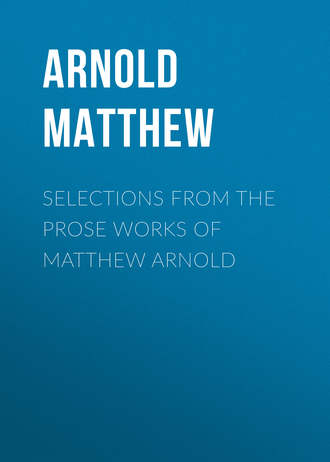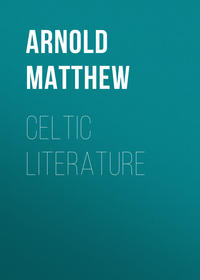 полная версия
полная версияSelections from the Prose Works of Matthew Arnold
171
~Firdusi~. A Persian poet, author of the epic poem, the Shahnama, or "Book of Kings," a complete history of Persia in nearly sixty thousand verses.
172
~Dr. Döllinger~. A German theologian and church historian (1799-1890).
173
Spanish Atrides, Romancero, Works, ed. 1905, pp. 200-04.
174
~Henry of Trastamare~. King of Castile (1369-79).
175
~garbanzos~. A kind of pulse much esteemed in Spain.
176
Adapted from Rom. VIII, 26.
177
From The Baths of Lucca, chap. IX, in Pictures of Travel, Works, III, 184-85.
178
Romancero, book III.
179
Romancero, book III.
180
~Laura~. The heroine of Petrarch's famous series of love lyrics known as the Canzoniere.
181
~Court of Love~. For a discussion of this supposed medieval tribunal see William A. Neilson's The Origins and Sources of the Court of Love, Studies and Notes in Philology and Literature, Boston, 1899, chap. VIII.
182
Disputation, Romancero, book III.
183
The Dying One, Romancero, book II, quoted entire.
184
Written from Paris, September 30, 1850. See Memoirs, ed. 1910, II, 226-27.
185
Reprinted from The Victoria Magazine, II, 1-9, November, 1863, in Essays in Criticism, 1865.
186
~John Stuart Mill~ (1806-73), English philosopher and economist. On Liberty (1859) is his most finished writing.
187
The Imitation of Christ (Imitatio Christi), a famous medieval Christian devotional work, is usually ascribed to Thomas à Kempis (1380-1471), an Augustinian canon of Mont St. Agnes in the diocese of Utrecht.
188
~Epictetus~. Greek Stoic philosopher (born c. A.D. 60). He is an earnest preacher of righteousness and his philosophy is eminently practical. For Arnold's personal debt to him see his sonnet To a Friend.
189
~Empedocles~. A Greek philosopher and statesman (c. 490-430 B.C.). He is the subject of Arnold's early poetical drama, Empedocles on Etna, which he later suppressed for reasons which he states in the Preface to the Poems of 1853. See Selections, pp. 1-3. [Transcriber's note: This approximates to the section following the text reference for Footnote 1 in this e-text.]
190
Encheiridion, chap. LII.
191
Ps. CXLIII, 10; incorrectly quoted.
192
Is. LX, 19.
193
Mal. IV, 2.
194
John I, 13.
195
John III, 5.
196
1 John V, 4.
197
Matt. XIX, 26.
198
2 Cor. V, 17.
199
Encheiridion, chap. XLIII.
200
Matt. XVIII, 22.
201
Matt. XXII, 37-39, etc.
202
~George Long~ (1800-79), classical scholar. He published Selections from Plutarch's Lives, 1862; Thoughts of Marcus Aurelius, 1862; etc.
203
~Thomas Arnold~ (1795-1842), English clergyman and headmaster of Rugby School, father of Matthew Arnold.
204
~Jeremy Collier~ (1650-1726). His best-known work is his Short View of the Immorality and Profaneness of the English Stage, 1698, a sharp and efficacious attack on the Post-Restoration drama. The Emperor M. Aurelius Antoninus, his Conversation with himself, appeared in 1701.
205
Meditations, III, 14.
206
~Antoninus Pius~. Roman Emperor, A.D. 138-161, and foster-father of M. Aurelius.
207
To become current in men's speech.
208
The real name of ~Voltaire~ was ~François Marie Arouet~. The name Voltaire was assumed in 1718 and is supposed to be an anagram of Arouet le j(eune).
209
See Function of Criticism, Selections, p. 36.[Transcriber's note: This approximates to the section following the text reference for Footnote 36 in this e-text.]
210
~Louis IX of France~ (1215-70), the leader of the crusade of 1248.
211
~The Saturday Review~, begun in 1855, was pronouncedly conservative in politics. It devoted much space to pure criticism and scholarship, and Arnold's essays are frequently criticized in its columns.
212
He died on the 17th of March, A.D. 180.[Arnold.]
213
~Juvenal's sixth satire~ is a scathing arraignment of the vices and follies of the women of Rome during the reign of Domitian.
214
See Juvenal, Sat. 3, 76.
215
Because he lacks an inspired poet (to sing his praises). Horace, Odes, IV, 9, 28.
216
~Avidius Cassius~, a distinguished general, declared himself Emperor in Syria in 176 A.D. Aurelius proceeded against him, deploring the necessity of taking up arms against a trusted officer. Cassius was slain by his own officers while M. Aurelius was still in Illyria.
217
~Commodus~. Emperor of Rome, 180-192 A.D. He was dissolute and tyrannical.
218
~Attalus~, a Roman citizen, was put to death with other Christians in A.D. 177.
219
~Polycarp~, Bishop of Smyrna, and one of the Apostolic Fathers, suffered martyrdom in 155 A.D.
220
~Tacitus~, Ab Excessu Augusti, XV, 44.
221
~Claude Fleury~ (1640-1723), French ecclesiastical historian, author of the Histoire Ecclésiastique, 20 vols., 1691.
222
Med., I, 12.
223
Ibid., I, 14.
224
Ibid., IV, 24.
225
Ibid., III, 4.
226
Ibid., V, 6.
227
Ibid., IX, 42.
228
~Lucius Annæus Seneca~ (c. 3 B.C.-A.D. 65), statesman and philosopher. His twelve so-called Dialogues are Stoic sermons of a practical and earnest character.
229
Med., III, 2.
230
Ibid., V, 5.
231
Ibid., VIII, 34.
232
Ibid., IV, 3.
233
Ibid., I, 17.
234
~Tiberius, Caligula, Nero, Domitian~. Roman Emperors, 14-37 A.D., 37-41 A.D., 54-68 A.D., and 81-96 A.D.
235
Med., IV, 28.
236
Ibid., V, 11.
237
Ibid., X, 8.
238
Ibid., IV, 32.
239
Ibid., V, 33.
240
Ibid., IX, 30.
241
Ibid., VII, 55.
242
Ibid., VI, 48.
243
Ibid., IX, 3.
244
Matt. XVII, 17.
245
Med., X, 15.
246
Ibid., VI, 45.
247
Ibid., V, 8.
248
Ibid., VII, 55.
249
Ibid., IV, 1.
250
Ibid., X, 31.
251
Ibid.
252
~Alogi~. An ancient sect that rejected the Apocalypse and the Gospel of St. John.
253
~Gnosis~. Knowledge of spiritual truth or of matters commonly conceived to pertain to faith alone, such as was claimed by the Gnostics, a heretical Christian sect of the second century.
254
The correct reading is tendebantque (Æneid, VI, 314), which Arnold has altered to apply to the present case.
255
From On The Study of Celtic Literature, London, 1867, chap. VI. It was previously published in the Cornhill Magazine, vols. XIII and XIV, March-July, 1866. In the Introduction to the book Arnold says: "The following remarks on the study of Celtic literature formed the substance of four lectures given by me last year and the year before in the chair of poetry at Oxford." The chapter is slightly abridged in the present selection.
256
Paradise Lost, III, 32-35.
257
Tasso, I, 2, 304-05.
258
~Menander~. The most famous Greek poet of the New Comedy (342-291 B.C.).
259
~Gemeinheit~. Arnold defines the word five lines below.
260
See The Function of Criticism, Selections, Note 2, p. 42. [Transcriber's note: This is Footnote 42 in this e-text.]
261
~Bossuet~. See The Function of Criticism, Selections, Note 2, p. 49.[Transcriber's note: This is Footnote 60 in this e-text.]
262
~Henry St. John, Viscount Bolingbroke~ (1678-1751), English statesman and man of letters, was author of the Idea of a Patriot King. Arnold is inclined to overestimate the quality of his style.
263
~Taliessin~ and ~Llywarch Hen~ are the names of Welsh bards, supposedly of the late sixth century, whose poems are contained in the Red Book of Hergest, a manuscript formerly preserved in Jesus College, Oxford, and now in the Bodleian. Nothing further is known of them. ~Ossian~, ~Ossin~, or ~Oisin~, was a legendary Irish third century hero and poet, the son of Finn. In Scotland the Ossianic revival was due to James Macpherson. See Note 1, p. 181.[Transcriber's note: This is Footnote 262 in this e-text.]
264
From the Black Book of Caermarthen, 19.
265
~James Macpherson~ (1736-96) published anonymously in 1760 his Fragments of Ancient Poetry, collected in the Highlands of Scotland and translated from the Gaelic or Erse language. This was followed by an epic Fingal and other poems. Their authenticity was early doubted and a controversy followed. They are now generally believed to be forgeries. The passage quoted, as well as references to Selma, "woody Morven," and "echoing Lora" (not Sora), is from Carthon: a Poem.
266
~Werther~. Goethe's Die Leiden des jungen Werthers (1774) was a product of the Sturm und Drang movement in German literature, and responsible for its sentimental excesses. Goethe mentions Ossian in connection with Homer in Werther, book II, "am 12. October," and translates several passages of considerable length toward the close of this book.
267
~Prometheus~. An unfinished drama of Goethe's, of which a fine fragment remains.
268
For ~Llywarch Hen~, see Note 1, p. 180.[Transcriber's note: This is Footnote 260 in this e-text.] The present quotation is from book II of the Red Book. A translation of the poem differing somewhat from the one quoted by Arnold is contained in W.F. Skene's The Four Ancient Books of Wales, Edinburgh, 1868.
269
From On this day I complete my thirty-sixth year, 1824.
270
From Euthanasia, 1812.
271
~Manfred, Lara, Cain~. Heroes of Byron's poems so named.
272
From Paradise Lost, I, 105-09.
273
Rhyme,—the most striking characteristic of our modern poetry as distinguished from that of the ancients, and a main source, to our poetry, of its magic and charm, of what we call its romantic element– rhyme itself, all the weight of evidence tends to show, comes into our poetry from the Celts.[Arnold.] A different explanation is given by J. Schipper, A History of English Versification, Oxford, 1910: "End-rhyme or full-rhyme seems to have arisen independently and without historical connection in several nations…. Its adoption into all modern literature is due to the extensive use made of it in the hymns of the church."
274
Lady Guest's Mabinogion, Math the Son of Mathonwy, ed. 1819, III, 239.
275
Mabinogion, Kilhwch and Olwen, II, 275.
276
Mabinogion, Peredur the Son of Evrawc, I, 324.
277
Mabinogion, Geraint the Son of Erbin, II, 112.
278
~Novalis~. The pen-name of ~Friedrich von Hardenberg~ (1772-1801), sometimes called the "Prophet of Romanticism." See Carlyle's essay on Novalis.
279
For ~Rückert~, see Wordsworth, Selections, Note 4, p. 224. [Transcriber's note: This is Footnote 356 in this e-text.]
280
Take the following attempt to render the natural magic supposed to pervade Tieck's poetry: "In diesen Dichtungen herrscht eine geheimnissvolle Innigkeit, ein sonderbares Einverständniss mit der Natur, besonders mit der Pflanzen-und Steinreich. Der Leser fühlt sich da wie in einem verzauberten Walde; er hört die unterirdischen Quellen melodisch rauschen; wildfremde Wunderblumen schauen ihn an mit ihren bunten sehnsüchtigen Augen; unsichtbare Lippen küssen seine Wangen mit neckender Zärtlichkeit; hohe Pilze, wie goldne Glocken, wachsen klingend empor am Fusse der Bäume"; and so on. Now that stroke of the hohe Pilze, the great funguses, would have been impossible to the tact and delicacy of a born lover of nature like the Celt; and could only have come from a German who has hineinstudirt himself into natural magic. It is a crying false note, which carries us at once out of the world of nature-magic, and the breath of the woods, into the world of theatre-magic and the smell of gas and orange-peel.[Arnold.]
~Johann Ludwig Tieck~ (1773-1853) was one of the most prominent of the German romanticists. He was especially felicitous in the rehandling of the old German fairy tales. The passage quoted above is from Heine's Germany, Part II, book II, chap. II. The following is the translation of C.G. Leland, slightly altered: "In these compositions we feel a mysterious depth of meaning, a marvellous union with nature, especially with the realm of plants and stones. The reader seems to be in an enchanted forest; he hears subterranean springs and streams rustling melodiously and his own name whispered by the trees. Broad-leaved clinging plants wind vexingly about his feet, wild and strange wonderflowers look at him with vari-colored longing eyes, invisible lips kiss his cheeks with mocking tenderness, great funguses like golden bells grow singing about the roots of trees."
281
Winter's Tale, IV, iii, 118-20.
282
Arnold doubtless refers to the passage in The Solitary Reaper referred to in a similar connection in the essay on Maurice de Guérin, though Wordsworth has written two poems To the Cuckoo.
283
The passage on the mountain birch-tree, which is quoted in the essay on Maurice de Guérin, is from Sénancour's Obermann, letter 11. For his delicate appreciation of the Easter daisy see Obermann, letter 91.
284
. Pope's Iliad, VIII, 687.
285
Propertius, Elegies, book I, 20, 21-22: "The band of heroes covered the pleasant beach with leaves and branches woven together."
286
Idylls, XIII, 34. The present reading of the line gives[Greek: hekeito, mega]: "A meadow lay before them, very good for beds."
287
From the Ode to a Grecian Urn.
288
That is, Dedication.
289
From the Ode to a Nightingale.
290
Ibid.
291
Virgil, Eclogues, VII, 45.
292
Ibid., II, 47-48: "Plucking pale violets and the tallest poppies, she joins with them the narcissus and the flower of the fragrant dill."
293
Ibid., II, 51-52: "I will gather quinces, white with delicate down, and chestnuts."
294
Midsummer Night's Dream, II, i, 249-52.
295
Merchant of Venice, V, i, 58-59.
296
Midsummer Night's Dream, II, i, 83-85.
297
Merchant of Venice, V, i, 1 ff.
298
Reprinted from the Fortnightly Review for June, 1877, in Mixed Essays, Smith, Elder & Co., 1879. ~Amandine Lucile Aurore Dudevant~, née ~Dupin~ (1804-76), was the most prolific woman writer of France. The pseudonym ~George Sand~ was a combination of George, the typical Berrichon name, and Sand, abbreviated from (Jules) Sandeau, in collaboration with whom she began her literary career.
299
~Indiana~, George Sand's first novel, 1832.
300
~Nohant~ is a village of Berry, one of the ancient provinces of France, comprising the modern departments of Cher and Indre. The ~Indre~ and the ~Creuse~ are its chief rivers. ~Vierzon, Châteauroux, Le Châtre~, and ~Ste.-Sévère~ are towns of the province. ~Le Puy~ is in the neighboring department of Haute-Loire, and ~La Marche~ is in the department of Vosges. For the ~Vallée Noire~ see Sand's The Miller of Angibault, chap. III, etc.
301
~Jeanne~. The first of a series of novels in which the pastoral element prevails. It was published in 1844.
302
The ~Pierres Jaunâtres~ (or ~Jomâtres~) is a district in the mountains of the Creuse (see Jeanne, Prologue). ~Touix Ste.-Croix~ is a ruined Gallic town (Jeanne, chap. I). For the druidical stones of ~Mont Barlot~ see Jeanne, chap. VII.
303
~Cassini's great map~. A huge folio volume containing 183 charts of the various districts of France, published by Mess. Maraldi and Cassini de Thury, Paris, 1744.
304
For an interesting description of the patache, or rustic carriage, see George Sand's Miller of Angibault, chap. II.
305
~landes~. An infertile moor.
306
~Maurice and Solange~. See, for example, the Letters of a Traveller.
307
~Chopin~. George Sand's friendship for the composer Chopin began in 1837.
308
~Jules Michelet~ (1798-1874), French historian.
309
~her death~. George Sand died at Nohant, June 8, 1876.
310
. From the Journal d'un Voyageur, September 15, 1870, ed. 1871, p. 2.
311
~Consuelo~ (1842-44) is George Sand's best-known novel.
312
~Edmée, Geneviève, Germain~. Characters in the novels Mauprat, André, and La Mare au Diable.
313
~Lettres d'un Voyageur, Mauprat, François le Champi~. Published in 1830-36, 1836, and 1848.
314
~F.W.H. Myers~ (1843-1901), poet and essayist. See his Essays, Modern, ed. 1883, pp. 70-103.
315
~Valvèdre~. Published in 1861.
316
~Werther~. See The Contribution of the Celts, Selections, Note 1, p. 182.[Transcriber's note: This is Footnote 263 in this e-text.]
317
~Corinne~. An esthetic romance (1807) by Mme. de Staël.
318
~Valentine~ (1832), George Sand's second novel, pointed out "the dangers and pains of an ill-assorted marriage." ~Lélia~ (1833) was a still more outspoken diatribe against society and the marriage law.
319
From Lélia, chap. LXVII.
320
~Jacques~ (1834), the hero of which is George Sand in man's disguise, sets forth the author's doctrine of free love.
321
From Jacques, letter 95.
322
From Lettres d'un Voyageur, letter 9.
323
Ibid., à Rollinat, September, 1834.
324
~Hans Holbein~, the younger (1497-1543), German artist.
325
From La Mare au Diable, chap. 1.
326
Ibid., The Author to the Reader.
327
Ibid., chap. 1.
328
Ibid., chap. 1.
329
From Impressions et Souvenirs, ed. 1873, p. 135.
330
Ibid., p. 137.
331
From Wordsworth's Lines Composed a few Miles above Tintern Abbey.
332
From Impressions et Souvenirs, p. 136.
333
Ibid., p. 139.
334
Ibid., p. 269.
335
Ibid., p. 253.
336
See The Function of Criticism, Selections, p. 29.[Transcriber's note: This approximates to the section following the text reference for Footnote 29 in this e-text.]
337
~Émile Zola~ (1840-1902), French novelist, was the apostle of the "realistic" or "naturalistic" school. L'Assommoir (1877) depicts especially the vice of drunkenness.
338
From Journal d'un Voyageur, February 10, 1871, p. 305.
339
~Émile Louis Victor de Laveleye~ (1822-92), Belgian economist. He was especially interested in bimetallism, primitive property, and nationalism.



